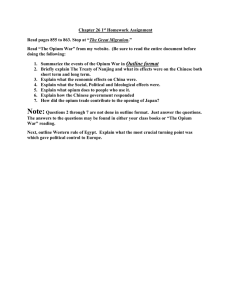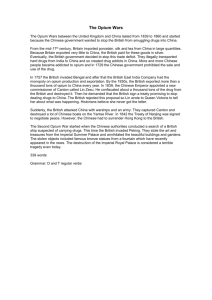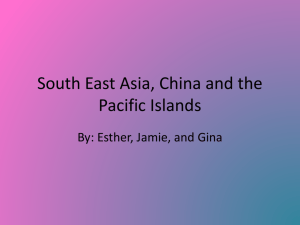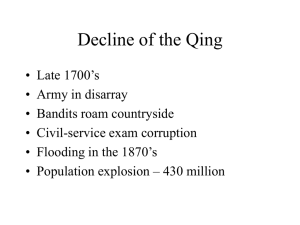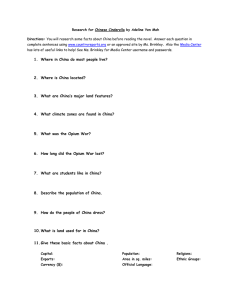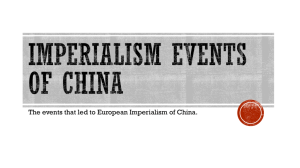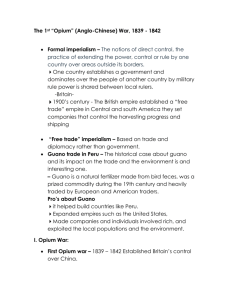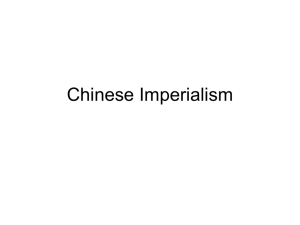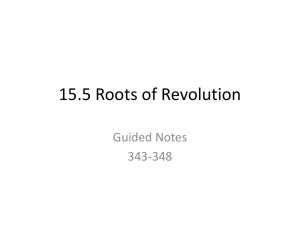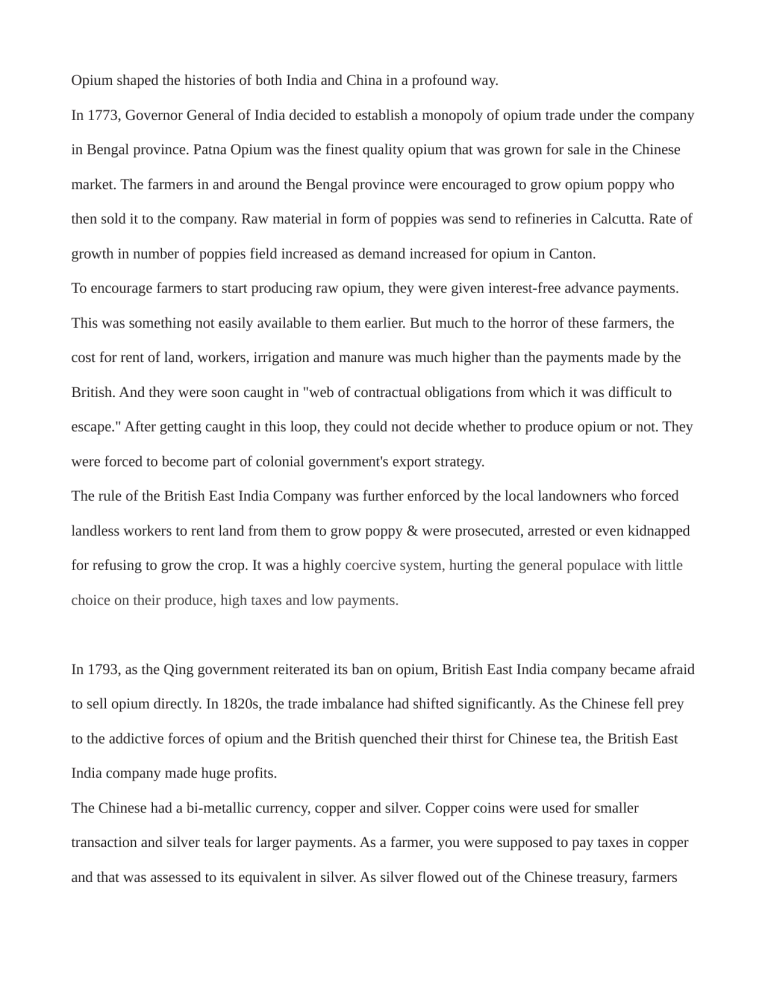
Opium shaped the histories of both India and China in a profound way. In 1773, Governor General of India decided to establish a monopoly of opium trade under the company in Bengal province. Patna Opium was the finest quality opium that was grown for sale in the Chinese market. The farmers in and around the Bengal province were encouraged to grow opium poppy who then sold it to the company. Raw material in form of poppies was send to refineries in Calcutta. Rate of growth in number of poppies field increased as demand increased for opium in Canton. To encourage farmers to start producing raw opium, they were given interest-free advance payments. This was something not easily available to them earlier. But much to the horror of these farmers, the cost for rent of land, workers, irrigation and manure was much higher than the payments made by the British. And they were soon caught in "web of contractual obligations from which it was difficult to escape." After getting caught in this loop, they could not decide whether to produce opium or not. They were forced to become part of colonial government's export strategy. The rule of the British East India Company was further enforced by the local landowners who forced landless workers to rent land from them to grow poppy & were prosecuted, arrested or even kidnapped for refusing to grow the crop. It was a highly coercive system, hurting the general populace with little choice on their produce, high taxes and low payments. In 1793, as the Qing government reiterated its ban on opium, British East India company became afraid to sell opium directly. In 1820s, the trade imbalance had shifted significantly. As the Chinese fell prey to the addictive forces of opium and the British quenched their thirst for Chinese tea, the British East India company made huge profits. The Chinese had a bi-metallic currency, copper and silver. Copper coins were used for smaller transaction and silver teals for larger payments. As a farmer, you were supposed to pay taxes in copper and that was assessed to its equivalent in silver. As silver flowed out of the Chinese treasury, farmers and low-income workers had to shell out more copper hence eating away a major chunk of their income. This further strained general populace of China and didn't increase revenue. As the Chinese saw the size of their trouble, they thought of legalizing opium. It was omnipresent and they could enforce a government monopoly. This included seizing goods of foreigners and cutting off supplies. The friction between Commissioner Lin, Chinese official send to Canton and British superintendent of trade, Captain Elliot was the collision of Chinese and British thought on opium trade. As these collision increased, it was clear that war was inevitable. As the First Opium War progressed, it was clear that the Chinese junks were no match for the British man-of-wars and Chinese foot-soldiers overwhelmed by their British counterparts. British advance to Nanjing was halted by the call for truce by the Emperor. The treaty that followed was known as the "Treaty of Nanjing" in 1842. There were hard concessions on the Qing. It forced open Chinese market that was then restricted to the port of Canton under the Qing Empire to the 5 different ports that the British demanded. Qing were forced to pay 21 million silver dollars to the British as a payment for the expenses of war. Abolition of the Cohong Monopoly, moderate tariffs and limited duties were other provisions included. The treaty did not include opium, which might have been because of the embarrassment of the British and opium traders which had at first started it. Many historians are for the fact that Opium War was the beginning of modern China. The war bought China (the Qing) into the world political system, much against it's will. They were forced to meet new technologies, like the steam-powered iron ship that could go up river. It forced the Chinese to try to catch up to the European power in terms of technologies for the rest of the century. After the war, it became clear that Qing could not stop the inflow of goods, machines, guns and most importantly ideas into China. It to a mixture of internal and external affairs that further affected the Qing Empire. As these problems mounted on top of each other, historians termed this for the Qing as "Disasters within and without." Opium was the one of most important issue that affected the relationship of British India and Imperial China. The relationship was one that had a common party, the British Empire that was dictating terms of economic trade using it's unassailable military might. Both British India and Imperial China's populace suffered under the rules of economic trade, domestic consumption and war set by a power that was alien to them. Someone whom they could not resist on their own. As for the representation of both the countries in each other land was restricted to the knowledge the British gave each of them about each other. Imperial China and British India served as the two points of British trade of tea and opium. Commodity was grown in India, shipped to China where it was exchanged for silver in Canton for tea & silk which was shipped back to Britain to be sold in the London markets.
